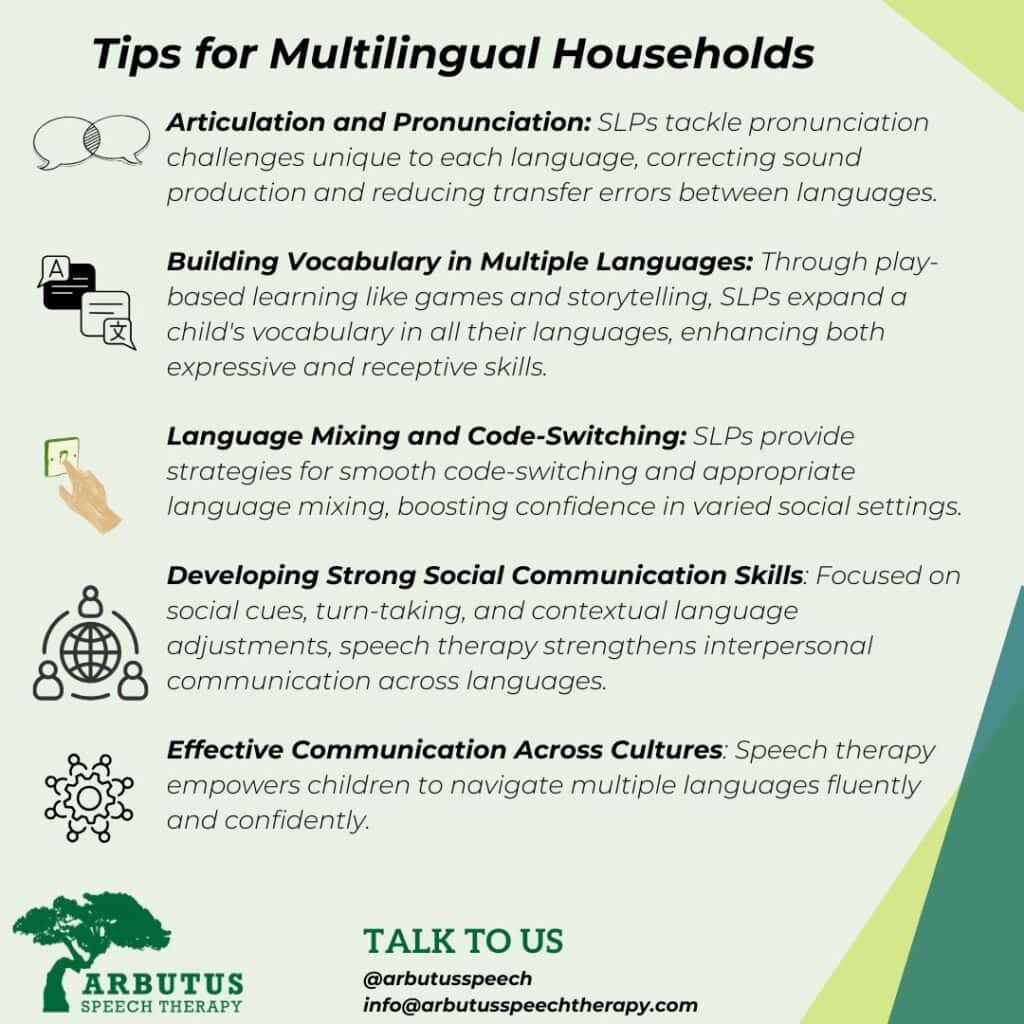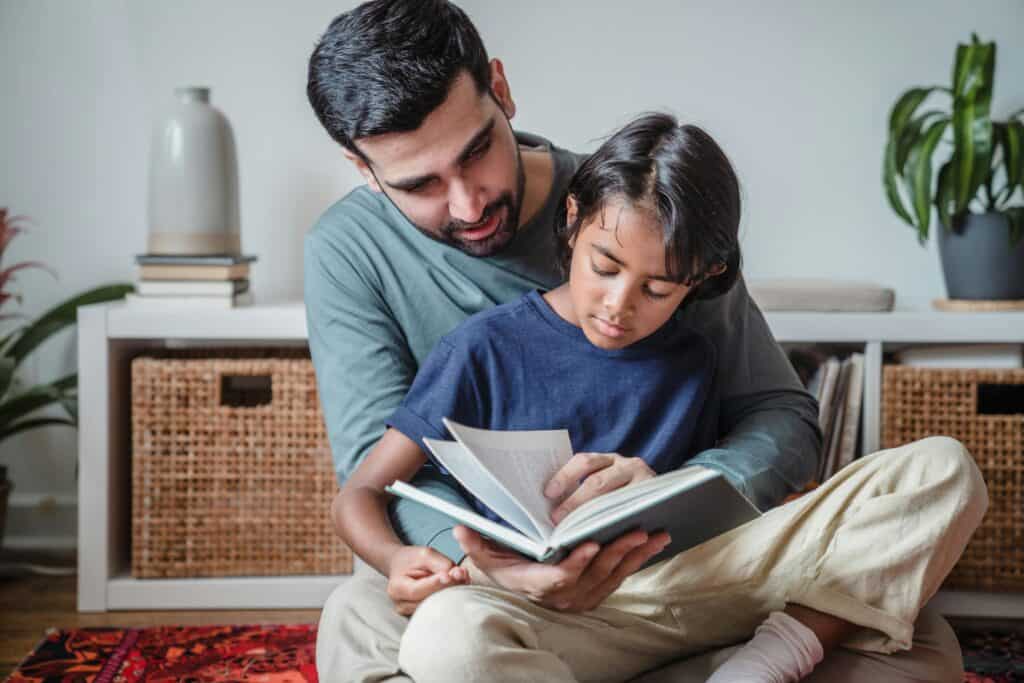Raising children in a multilingual environment is increasingly common, as many parents seek to preserve their cultural heritage, strengthen family bonds, and provide their children with the cognitive advantages of bilingualism or multilingualism. While the benefits are numerous, it’s normal for parents to have concerns about how speaking multiple languages might impact language development. Could exposure to more than one language confuse children or delay their speech? How do you support language growth in a home with multiple languages?
This article will clarify common myths, highlight the benefits of multilingualism, and explain how speech therapy can play a crucial role in supporting children’s language development, helping them thrive in multilingual settings.
Debunking Myths About Multilingual Language Development
A common misconception is that growing up with more than one language might confuse a child or cause speech delays. However, research consistently shows that this is not the case. In fact, children’s brains are highly adaptable, and they have a remarkable ability to absorb and manage multiple languages without confusion.
One myth is that multilingual children might mix languages and that this mixing indicates confusion. In reality, “code-switching”—switching between languages within the same conversation—is a natural and normal part of multilingual language development. Children mix languages as they learn, testing which words work best in different situations. Over time, they learn to separate their languages appropriately based on context.
The Benefits of Multilingualism
Rather than causing issues, multilingualism provides unique benefits that extend beyond language skills. Studies have shown that children who grow up in multilingual homes often develop stronger cognitive abilities, such as problem-solving and flexible thinking. They tend to have a greater understanding of different cultures and may adapt more easily in diverse social environments. Additionally, learning multiple languages early in life can enhance the brain’s ability to learn even more languages in the future.
For parents, fostering a multilingual environment is one of the best ways to prepare children for a globalized world. By encouraging bilingual or multilingual language skills, parents are equipping their children with a valuable asset that can benefit them personally, academically, and professionally throughout their lives.
How Speech Therapy Can Support Multilingual Families
While multilingualism is beneficial, each child’s language development journey is unique, and some children may face language challenges, such as articulation issues or delayed vocabulary growth. Speech therapy offers specialized support, helping children in multilingual homes develop strong communication skills in each language.
Speech-language pathologists (SLPs) have expertise in language acquisition and can provide personalized guidance for multilingual children, addressing specific needs while respecting the child’s cultural and linguistic background. Here’s how speech therapy can help:

1. Articulation and Pronunciation
For multilingual children, pronunciation challenges can vary across languages. Certain sounds might exist in one language but not in another, or a child might transfer pronunciation rules from one language to another. An SLP can identify any specific articulation issues and provide exercises to help the child produce sounds correctly in each language, ensuring clarity and preventing misunderstandings.
2. Building Vocabulary in Multiple Languages
SLPs work with children to build vocabulary in both (or all) of their languages. This is often done through targeted, play-based activities that make learning fun and interactive. For example, an SLP might use storytelling, games, or picture books to reinforce vocabulary, helping children expand their expressive and receptive language skills in each language without overloading them.
3. Language Mixing and Code-Switching
Although language mixing is normal, some children may need extra help learning when and how to use each language. Speech therapists can teach strategies that help children navigate different linguistic contexts smoothly. This way, children can feel confident switching between languages based on the setting or the people they’re speaking with.
4. Developing Strong Social Communication Skills
Social language skills—such as understanding conversational cues, taking turns, and adjusting language use based on social context—are key to effective communication in any language. SLPs incorporate social communication exercises into therapy, ensuring children can communicate comfortably and appropriately with family members, friends, and teachers in each language.
Tips for Supporting Language Development at Home
Parents play a vital role in supporting language development at home, and a few practical strategies can help create a supportive language-learning environment:
- Be Consistent with Language Use: Try to be consistent about when and where you use each language. For example, some families choose to speak one language at home and another in social or community settings. This consistency helps children build a clearer understanding of when to use each language.
- Narrate Everyday Activities: Describe actions and objects in each language throughout daily routines. For instance, if you’re cooking, you might name ingredients in one language and describe actions in another. This way, children can connect vocabulary with real-life experiences.
- Read Books in Both Languages: Reading books in each language is a powerful way to reinforce vocabulary and sentence structure. Choose storybooks in both languages and ask questions as you read together to support comprehension.
- Encourage Storytelling and Play: Encourage children to tell stories or engage in play that involves both languages. Play-based activities like role-playing with toys or acting out scenarios can help children practice switching between languages in a natural way.
When to Consider Speech Therapy
If you notice your child struggling with language milestones, such as difficulty speaking clearly, limited vocabulary, or challenges in using both languages appropriately, it might be helpful to consult a speech-language pathologist. Early intervention can address these challenges before they impact academic or social development.
How Arbutus Speech Therapy can help
Multilingualism is a wonderful gift, and with the right approach, children can thrive in a multilingual environment. Speech therapy provides valuable support for multilingual families, helping children develop strong language skills across all their languages. At Arbutus Speech Therapy, our SLPs specialize in working with multilingual children, offering tailored strategies that respect each child’s unique language background and goals.
If you’re interested in learning more about supporting language development in a multilingual home, contact Arbutus Speech Therapy to schedule a free consultation. Let’s help your child build the communication skills they need to succeed in every language they speak.

